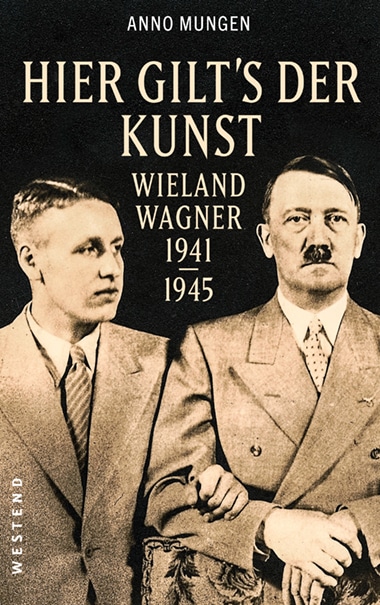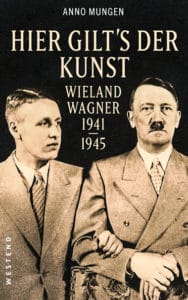How close were the Wagners to Hitler?
NewsNo closer than arm-in-arm.
This forthcoming book about Wieland Wagner’s wartime activities says that Wieland became a surrogate son to Hitler after his father, Siegfried, died in 1930.
Of course (as the title implies), they only talked about art.
Nothing about atrocities.
And Wieland popped up perfectly clear from the Persil wash after the war.
As did the Bayreuth Festival.







This book was publishes a year ago and nothing, really nothing in it is new.
“And Wieland popped up perfectly clear from the Persil wash after the war.
As did the Bayreuth Festival.”
Well, nobody complains that George Soros, at 14 years of age, was working for a man aiding and abetting Hungarian fascists. Or that Klaus Schwab’s father Eugen was the managing director of the Escher-Wyss Ravensburg factory (which employed slave labor to produce turbines as part of the Nazi nuclear effort).
Which is worse for the world? Bayreuth or Davos?
Well, actually, I think you just did.
And he’s right to.
Stupid comment!!! Without Soros, Hungarian people would probably already live under a dictatorship of Viktor Orban. Orban, Kaczynski, Le Pen are the dangers for democracy, not Soros. It‘s widely known there are Putin’s trolls, now it’s obvious there are Orban trolls, too.
Daddy issues, it’s always daddy issues.
I can’t get Sylvia Plath out of my head, it’s as though she wrote her poem *about* Wieland Wagner, with the biographical coincidences:
“I was ten when they buried you.
At twenty I tried to die
And get back, back, back to you.
…
And then I knew what to do.
I made a model of you,
A man in black with a Meinkampf look
And a love of the rack and the screw.
And I said I do, I do.
…
Daddy, you can lie back now.
There’s a stake in your fat black heart
And the villagers never liked you.
They are dancing and stamping on you.
They always knew it was you.
Daddy, daddy, you bastard, I’m through.”
Wieland and Wolfgang were teenagers at the time and their mother infatuated with the man who ran the country who also came to stay at their house. It’s oh so terribly easy to virtue signal after the event. Give it a rest.
Hitler thought Wieland very special and excused him from military service. Wolfgang, not so special and he served in the Wehrmacht. Wieland’s terse one-liner about Hitler after Bayreuth reopened in 1951 was: “After Auschwitz, there can be no further talk of Hitler.” To her credit, Katharina has made the Festival come directly to grips with its Nazi past, as is evidenced by the very moving memorials on site to the Jewish artists who sang or played there in WW2. She is to be commended. Unfortunately, this connection- Wagner-Hitler, will never go away. But if you love RW’s art, you know that it’s like Shakespeare: Timeless, and it exists in its own universe, creator and expropriators be damned.
This again. Can’t we just enjoy Richard Wagner’s music without having to feel insanely guilty for atrocities that came AFTER his time. I really don’t care about Wieland or the rest of them – they didn’t write the music. Yes, they were horrible.
“Before Tristan und Isolde I stand in wonder and terror.” –Giuseppe Verdi
I think Thomas Mann explores a similar idea in Dr. Faustus, the idea that somewhere around 1870, Europe began a trajectory toward horror that some felt was discernable in its cultural expression.
I marvel at the themes the musicological community overlooks.
Blame Wieland‘s mother.
And Bayreuth did not pop up „perfectly clear“ after the war, the Nazi stains are in fact washed on until today. But Wagner‘s music is bigger than all of that.
Talking of Hitler’s mother, I haven’t read Anno Mungen’s book and don’t intend to do so. I have, though, read Brigitte Hamman’s excellent biography of Winifred Wagner and that tells me virtually all I want to know. The one gap I would love to see filled is the correspondence between Winifred and Hitler. Apparently all branches of the family have to agree before they can be released, and someone is holding out for some reason. Allegedly this is Winifred’s granddaughter Amelie whose father Bodo Lafferentz was a high ranking SS officer assigned to the Race and Settlement Central Agency of the Reich. Amelie has resisted legal attempts to unseal the correspondence, calling it “explosive”.
That said, as many have written, Wagner’s music is bigger than the association with Hitler and the Nazis which occurred long after his death.